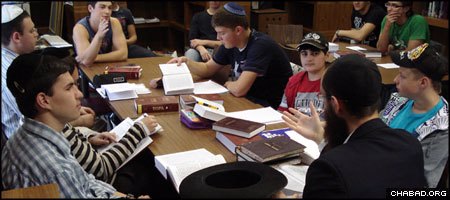As Jewish communities the world over took note of the 70th anniversary of the Nazi-coordinated pogroms known as Kristallnacht, a common thread throughout the commemorations was the special pride Holocaust survivors take in the signs of flourishing Jewish life throughout Germany.
There is a unique poignancy to seeing those signs in, of all cities, Berlin, a capital referred to by at least one survivor as “the heart of darkness.” Jewish life there has not only grown, but thrived: In the last year, more than 2,000 people – including Mayor Klaus Wowereit – attended a menorah lighting at the Brandenberg Gate coordinated by Chabad-Lubavitch of Berlin, while a slate of VIPs and notables turned out to celebrate the grand opening of the Szloma Albam House and Rohr Chabad Center. Today, locals are marking another milestone in the opening of the first Chabad-Lubavitch yeshiva in Western Europe for Jewish youth who did not grow up in traditional homes.
“My grandfather is a survivor, and when we first told him that we’d be going to Berlin as emissaries, he was apprehensive,” recalls Rabbi Yehuda Tiechtel, director of Chabad-Lubavitch of Berlin. “Then he thought about it and he said, ‘You should go. This is the best and strongest message to send: that Jewish life will once again flourish there.’
“Our answer to darkness is to increase light,” he added.
Tora Kolleg – it’s pronounced “Torah college” – opened in September at the Rohr Chabad Center, a grand structure that houses a synagogue, restaurant, student and education center, library, Jewish ritual bath and Judaica shop. The yeshiva offers students the chance immerse themselves in a comprehensive study of Jewish texts while completing their secular degrees. Those still in high school can elect to complete their general studies requirement through an affiliated school, while those in university can supplement their secular course load with classes in Torah, Talmud, Jewish law and Jewish mysticism.
Learning and Giving Back
Made up of immigrants from the former Soviet Union, the inaugural class of 15 students includes Ariel Elatow, who said that he was searching for an opportunity to study Torah full time.
“The learning here is really special,” said Elatow. “Each of the rabbis who teach here discuss things in a way that you can really absorb even the things that you once thought you couldn’t learn.
“I am in the advanced program,” he continued, “but even for people who come and don’t know the Hebrew alphabet yet, they can learn. Soon, they are learning Talmud.”
The genesis of the yeshiva can be traced to the expanding Jewish population of Berlin, and the growing interest in increased Jewish observance.
“Many young men came up to me to express their frustration that there was no program in the region where they could learn Torah at their level,” said Tiechtel, who arrived in the city in 1996. “We listened to their concerns at set out to establish a program where everyone could come and study.”
According to Tiechtel, plans are in the works for a similar program for women.
While most of their days are spent in study, students at the yeshiva avail themselves of the five-star dining available at the Rohr Chabad Center’s restaurant, which also serves as the yeshiva’s cafeteria. They also take time out of the week to give back to the greater community, spending one Shabbat a month in their hometowns as a visiting teacher.
“In the smaller communities, there is little to keep the youth interested,” remarked Tiechtel. “These students know their communities. They’re becoming the next generation of Jewish leaders.”




Start a Discussion